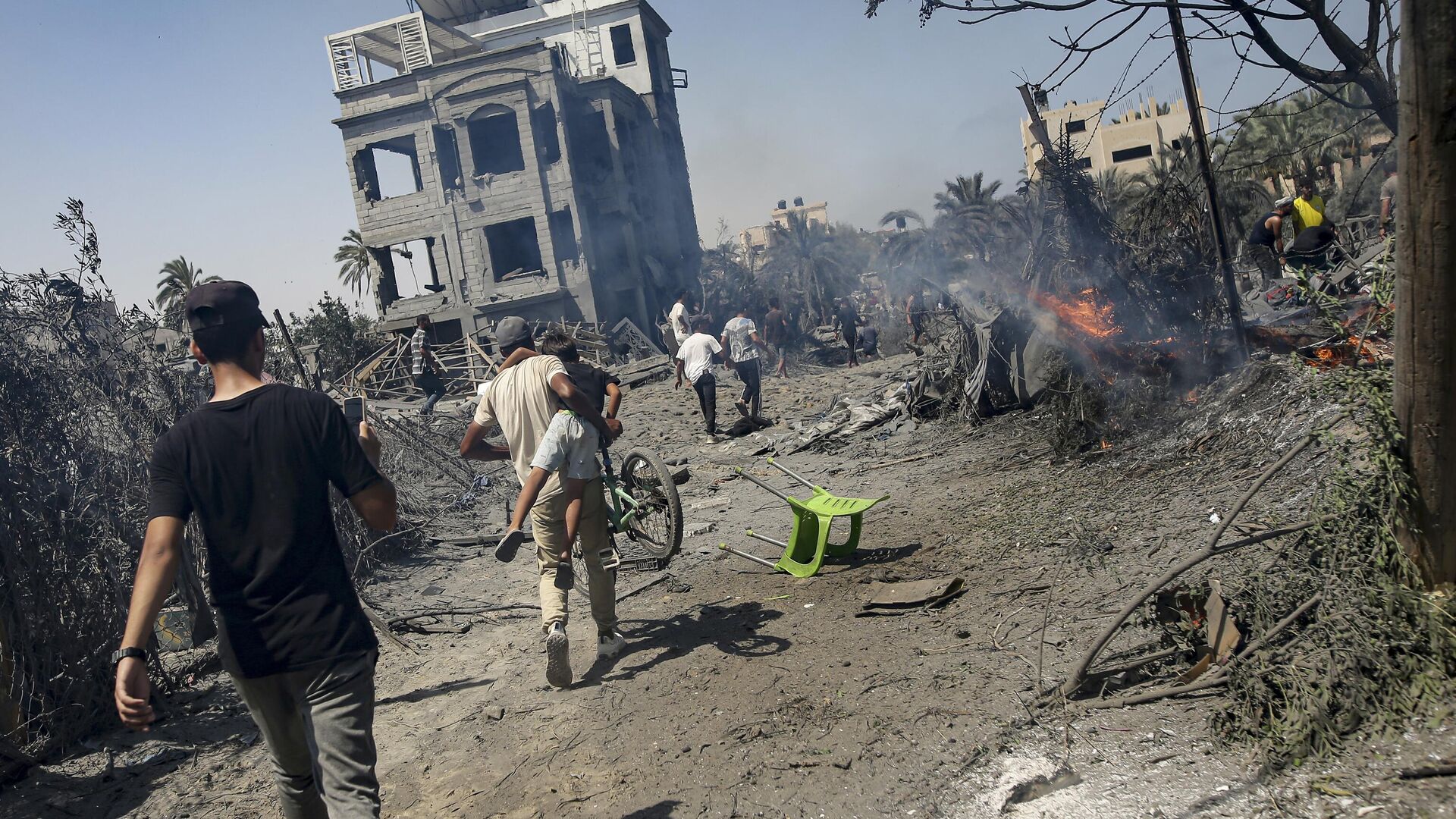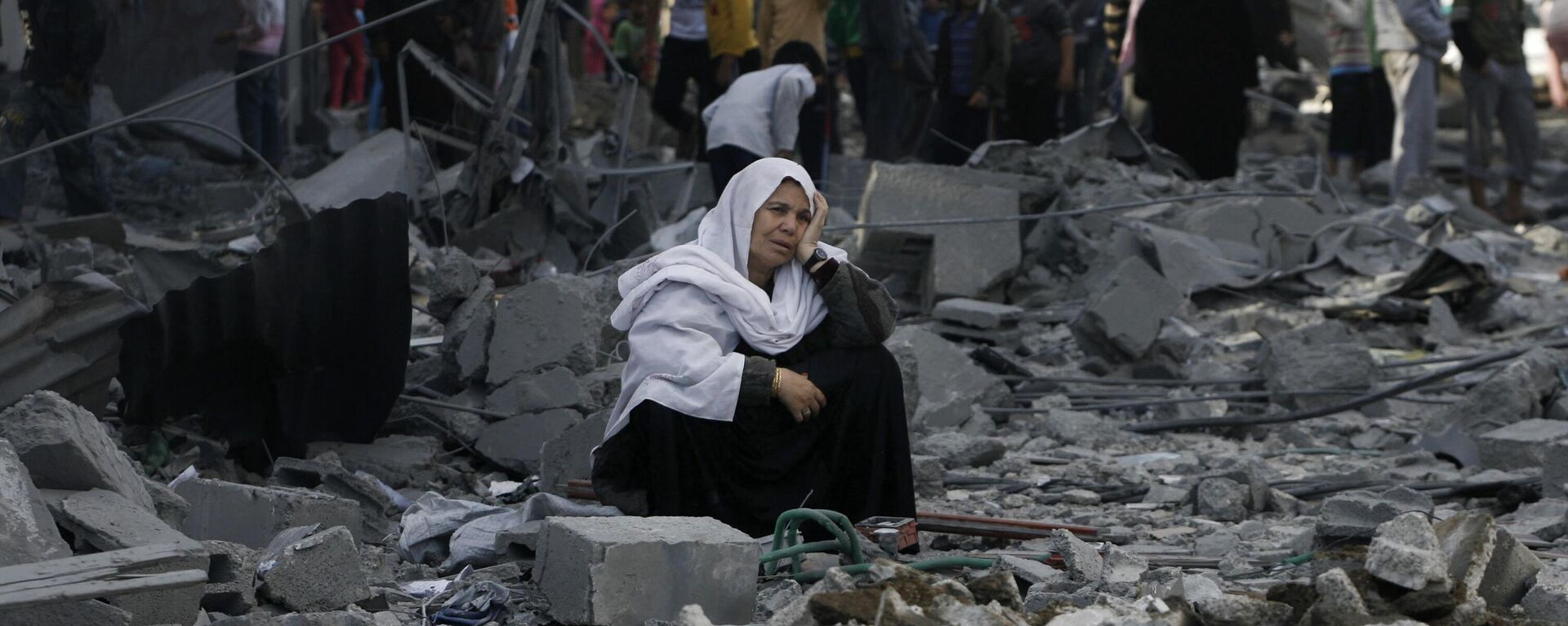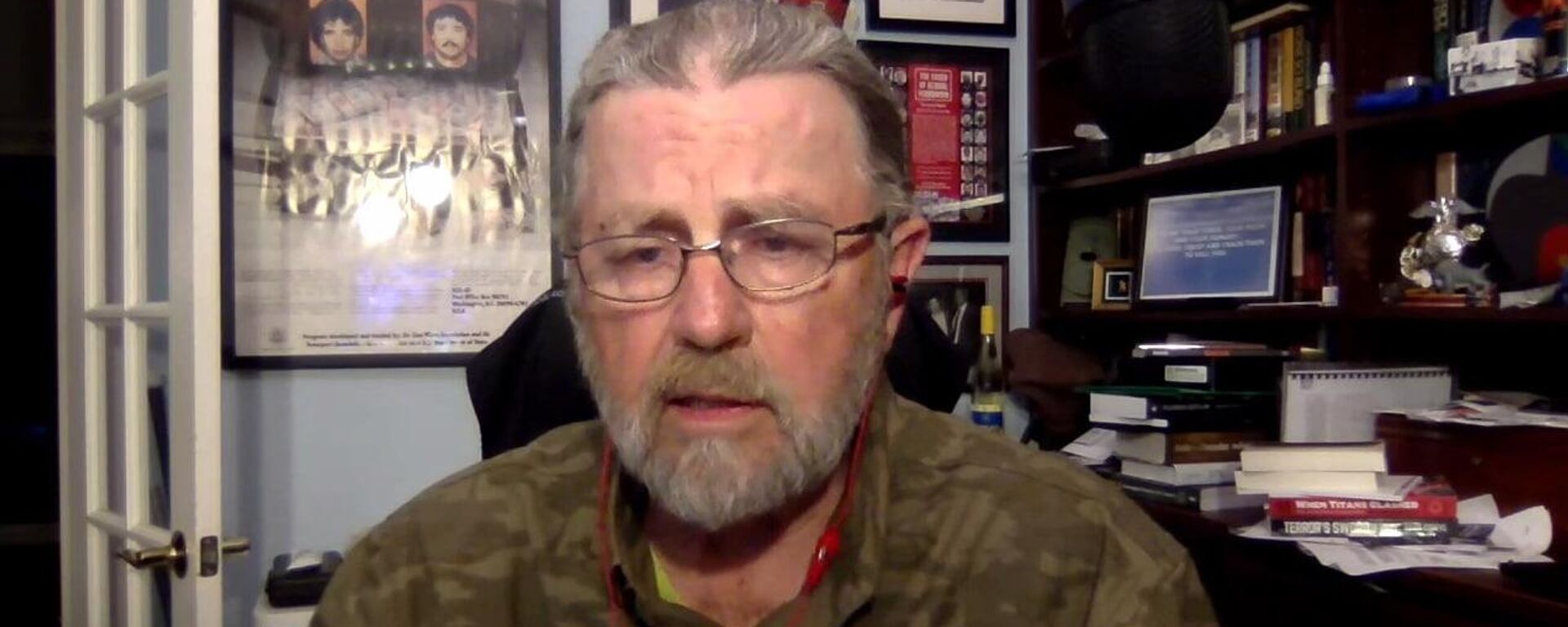https://sputnikglobe.com/20240731/haniyeh-killing-to-spoil-prospects-of-peace-talks-as-hardliners-push-for-strong-response-1119586263.html
Haniyeh Killing to Spoil Prospects of Peace Talks as Hardliners Push for 'Strong Response'
Haniyeh Killing to Spoil Prospects of Peace Talks as Hardliners Push for 'Strong Response'
Sputnik International
The assassination of Hamas political leader Ismail Haniyeh in Tehran, as well as Israel's strike on a senior Hezbollah official, will have a detrimental effect on the ceasefire negotiations in the Gaza Strip.
2024-07-31T19:40+0000
2024-07-31T19:40+0000
2024-07-31T19:39+0000
analysis
middle east
ismail haniyeh
israel
tehran
gaza strip
hamas
hezbollah
israel defense forces (idf)
assassination
https://cdn1.img.sputnikglobe.com/img/07e8/07/10/1119386772_0:209:3072:1937_1920x0_80_0_0_4d5f92d006645257e1c03f6c29cfb7bd.jpg
Earlier Wednesday, Hamas confirmed Haniyeh was killed in an Israeli attack on his residence in Tehran after he took part in the inauguration of newly elected Iranian president Masoud Pezeshkian. Late Tuesday, the Israel Defense Forces (IDF) announced it had carried out a strike in a southern suburb of Beirut, adding later that the "most senior military commander" of Lebanese Shia movement Hezbollah, Fuad Shukr, had been killed in the attack. A local source told Sputnik on Wednesday that Shukr's body had been found under the rubble. "I think that the Israeli assassinations in quick succession of leading figures in Hezbollah, which has been a strong supporter of Hamas, and Hamas itself are a major setback for efforts to secure a ceasefire and the release of hostages seized by Hamas in October," Gareth Jenkins, a non-resident senior research fellow with the Joint Center Silk Road Studies Program and Turkey Center at the Institute for Security and Development Policy in Stockholm, said. Furthermore, the death of Haniyeh, which is "a major blow for Hamas and a huge embarrassment for Iran," will increase the risk of the conflict between Israel and Hamas escalating into a regional war, the expert added. "There will be hardliners in both Hamas and Iran who will be pushing for a strong response," Jenkins said. At the same time, Iran's options are limited as Tehran "knows that it cannot defeat Israel on the battlefield," the expert also said. Meanwhile, Kanishkan Sathasivam, a professor in the political science department at Salem State University, believes the ceasefire negotiations will continue, although the situation is "very fluid" at the moment. "The peace talks will continue, if only because other actors such as Qatar and Egypt will insist to Hamas that they keep negotiating," Sathasivam said.The situation between Hezbollah and Israel is not quite as simple, he said. "So the question really is whether Iran wants a war with Israel or not? Whether we are talking about Hamas, or Hezbollah, or the Houthis, or militias in Iraq, these actors are all extensions of the regime in Tehran. Yes, they all have some measure of autonomy, but if Tehran gives them a direct order, they are not in any position to refuse that order," the expert concluded.
https://sputnikglobe.com/20240731/hamas-says-will-not-give-up-its-conditions-in-talks-with-israel-after-murder-of-haniyeh-1119579044.html
https://sputnikglobe.com/20240731/blatant-assassination-of-haniyeh-may-have-been-crossing-a-red-line--ex-cia-officer-1119576337.html
israel
tehran
gaza strip
Sputnik International
feedback@sputniknews.com
+74956456601
MIA „Rossiya Segodnya“
2024
Sputnik International
feedback@sputniknews.com
+74956456601
MIA „Rossiya Segodnya“
News
en_EN
Sputnik International
feedback@sputniknews.com
+74956456601
MIA „Rossiya Segodnya“
Sputnik International
feedback@sputniknews.com
+74956456601
MIA „Rossiya Segodnya“
fallout from killing of ismail haniyeh, who is ismail haniyeh, state of israeli-hamas conflict, response to haniyeh assassination
fallout from killing of ismail haniyeh, who is ismail haniyeh, state of israeli-hamas conflict, response to haniyeh assassination
Haniyeh Killing to Spoil Prospects of Peace Talks as Hardliners Push for 'Strong Response'
MOSCOW (Sputnik) - The assassination of Hamas political leader Ismail Haniyeh in Tehran, as well as Israel's strike on a senior Hezbollah official, will have a detrimental effect on the ceasefire negotiations in the Gaza Strip, experts told Sputnik.
Earlier Wednesday, Hamas confirmed Haniyeh was killed in an Israeli attack on his residence in Tehran after he took part in the inauguration of newly elected Iranian president Masoud Pezeshkian.
Late Tuesday, the Israel Defense Forces (IDF) announced it had carried out a strike in a southern suburb of Beirut, adding later that the "most senior military commander" of Lebanese Shia movement Hezbollah, Fuad Shukr, had been killed in the attack. A local source told Sputnik on Wednesday that Shukr's body had been found under the rubble.
"I think that the Israeli assassinations in quick succession of leading figures in Hezbollah, which has been a strong supporter of Hamas, and Hamas itself are a major setback for efforts to secure a ceasefire and the release of hostages seized by Hamas in October," Gareth Jenkins, a non-resident senior research fellow with the Joint Center Silk Road Studies Program and Turkey Center at the Institute for Security and Development Policy in Stockholm, said.
Furthermore, the death of Haniyeh, which is "a major blow for Hamas and a huge embarrassment for Iran," will increase the risk of the conflict between Israel and Hamas escalating into a regional war, the expert added.
"There will be hardliners in both Hamas and Iran who will be pushing for a strong response," Jenkins said.
At the same time, Iran's options are limited as Tehran "knows that it cannot defeat Israel on the battlefield," the expert also said.
"In the past, Iran has reacted to such setbacks by carrying out covert rather than overt attacks, including through its allies and proxies. The fear is that it might do so again, although the response may or may not be immediate," he said.
Meanwhile, Kanishkan Sathasivam, a professor in the political science department at Salem State University, believes the ceasefire negotiations will continue, although the situation is "very fluid" at the moment.
"The peace talks will continue, if only because other actors such as Qatar and Egypt will insist to Hamas that they keep negotiating," Sathasivam said.
"Hamas may break off talks for a few days in a purely symbolic act of defiance, but they will face too much pressure to be able to completely break off talks."
The situation between Hezbollah and Israel is not quite as simple, he said.
"So the question really is whether Iran wants a war with Israel or not? Whether we are talking about Hamas, or Hezbollah, or the Houthis, or militias in Iraq, these actors are all extensions of the regime in Tehran. Yes, they all have some measure of autonomy, but if Tehran gives them a direct order, they are not in any position to refuse that order," the expert concluded.




